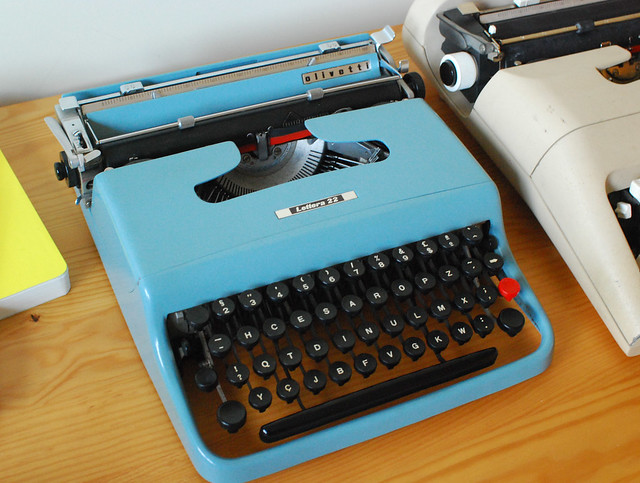There was a time when the typewriter ruled the earth and the dinosaurs were roaming into oblivion.

But that was a time when the typewriter liberated writing. It was the easiest and most direct way to put down on paper a structured text that could be given to anyone without being ashamed of the handwriting.
Yes, typewriters limited the typography available to the user, and all they had was monospaced fonts. But they allowed people to register their thoughts in unprecedented ways. They become a tool to organise the mind. The typewriter as a writing instrument became the tool of writers and journalists as much as the fountain pen or the pencil and pad of paper.
Test your writing speed at typeracerIn some cases, this was taken to extremes. Jack Kerouac used a typewriter to draft ‘On the road’ and was known to write at speeds in excess of 100 words per minute—I myself type on computers around 60wpm and find speeds over this to be very difficult in the typewriter—and did it on a scroll roll of continuous paper See picturesduring a three-week stay at a friends’ house.
— Are typewriters dead?
I don’t think so, I’ve managed to acquire a few typewriters recently see pictures on my Flickr account. Two of them are those beautiful Olivetti from the post-WW2 period when the Italian company hired many architects to design their products. They work flawlessly and provide you with a writing tool that makes it easy to draft documents without worrying with editing.
The biggest problem I feel I have when typing directly into the computer is that I’m constantly being distracted by email, by social networks or by some new kitten video from my someone in the virtual extended list of online ‘friends’.
Even when I use focusing tools I use Isolator on the Mac, I end up distracted by the editing possibilities of the tool. You pause for a moment and immediately you start thinking that you could edit the previous paragraph in some way. This editing task is a deterrent to the writing flow. That’s probably why so many participants of the Nanowrimo competition use typewriters. In this way, they don’t stop their thoughts to edit text. They just punch the keys and put their ideas down on paper. Editing is for later. Going back to Kerouac, when he wrote ‘On the road’ he even didn’t use paragraphs breaks Or used them sparsely to save time while going through the 36 meters of the paper.
— So you use typewriters?
I mainly use them as a note taking tool, the same way I use a notebook and a pen. I always have a typewriter on my working desk near my computer and I load a new clean sheet of paper every morning where I just put the date. When I’m reading something—a paper or a book, or even a website that I need to reference—I just make a small note—usually two or three lines of text—and move on doing what I have to do. In this way at the end of the day I collected a lot of notes that are already ‘printed’. I can reread them and organise them better in this way. I don’t need to fight my handwriting and if I want I can give it to someone and be confident they will understand the notes.
— Should you use a typewriter?
Probably no. If you have one, don’t use it, send it to me.